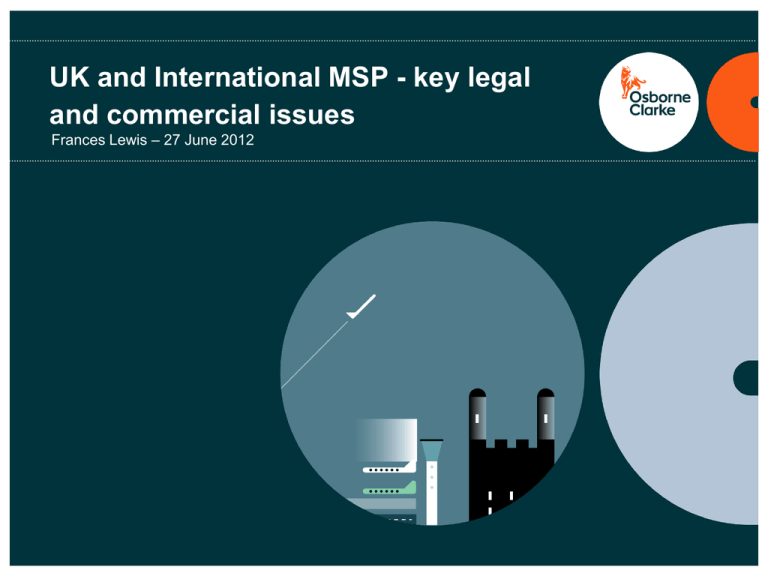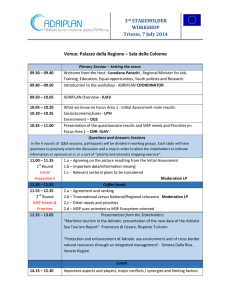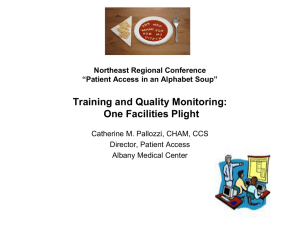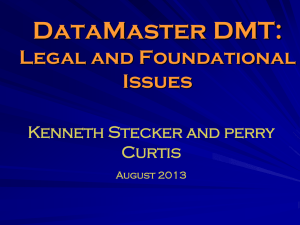UK and International MSP - Recruitment International
advertisement

UK and International MSP - key legal and commercial issues Frances Lewis – 27 June 2012 osborneclarke.com Agenda • Introduction • MSP contracting models: UK and beyond • Adapting contracts for international MSP • Key compliance issues for international MSP • Final word osborneclarke.com Introduction • 35% global US companies want global contingent workforce programmes by 2014 • Global staffing projects increasingly driven by hirer demand • US hirers and staffing companies worried about European legislation osborneclarke.com Introduction • General overview of the common themes – not country-specific • Each country has its own regime – there is NO one size fits all – Different laws – Different enforcement regimes – Different levels of risk – Different attitudes to the use of temporary workers = tolerance • There are ways to reduce risk to acceptable level BUT this usually requires investment and careful management • "Compliant" UK and overseas operations will add value to your business • Workplace tax is becoming a high profile issue = valuation issue osborneclarke.com Key issues – where do you start? What type(s) of recruitment business do you want to do? • Contract or permanent/both? • If contract, what type of workers and at what level? • What is your preferred supply model – a question of chicken and egg? • Is your preferred model potentially prohibited? – e.g. Belgium - prohibition on putting your "employees" at the disposal of a third party. Disguised employee risk? – is a licence or registration required? • Don't assume that overseas advisors will be familiar with UK staffing models osborneclarke.com MSP contracting models • UK MSP arrangements usually involve: – MSP acting as contractual (and payment) intermediary – …in relation to the supply by second tier staffing companies of all contingent workers • B2B independent contractors/freelancers/SOW contractors • leased employees/agency workers/"temps" • BUT in many countries this "MSP acting as principal" option is not: – lawful - e.g. German Federal Employment Agency considers that AUG leases may not operate in a chain – available – many staffing companies would not accept the prime contractor role for fear of inheriting tax and employment law risk osborneclarke.com MSP contracting models • "Principal" contract structures have been agreed in mainland European countries over the years: – usually involve a salesman at MSP offering more than can be delivered because he/she is desperate to win the hirer's account in US/UK – = implementation problems - end up with MSP pulling out/asking for the deal to change – some MSPs have just taken a risk and e.g. rely on unreliable/non- compliant local partners to pay contingent workers = lack of compliance – ("Principal" model may, with some adjustments, be ok if you just use genuine independent contractors) osborneclarke.com MSP contracting models • "Agency" model of MSP – MSP manages local staffing companies on behalf of hirer and (perhaps) fills some vacancies itself – Local staffing companies in fact have contracts direct with hirer, but the MSP "runs" those contracts and manages invoicing (consolidated invoicing etc.) E.g. AUG supplies in Germany • "Margin only" model of MSP – MSP appoints local recruitment companies to source contingent workers – Local recruitment company is paid margin only and MSP actually engages and supplies the workers to the hirer • Each country has its own variations of the agency and margin only models often involving payment intermediaries osborneclarke.com MSP contracting models • Benefits of "agency" MSP model: – Local compliance with licensing requirements – Reputable staffing companies happy to supply – (If MSP becomes insolvent e.g. Chimes the hirer's money is safe – reduces supply chain risk + MSPs often prefer because their credit risk reduces and profit ratio increases) – (If hirer falls out with MSP no need for novation of contracts with all second tier) • Downside of "agency" MSP model – (No "one butt to kick") osborneclarke.com MSP contracting models • Benefits of "margin only" MSP model: – Local compliance with licensing requirements – Reputable staffing companies happy to supply – Removes credit risk for second tier who should be happy to supply – (Hirer has "one butt to kick") • Downside of "margin only" MSP model: – (If MSP becomes insolvent e.g. Chimes the hirer's money is not safe) – (If hirer falls out with MSP = major novation exercise) osborneclarke.com Adapting contracts for international MSP • Global master services agreement with: – All-pervasive terms and conditions which will apply wherever the service is provided e.g. general pricing, general services, term/termination, IPR, confidentiality, some boilerplate – Template for local country agreements setting out what can be agreed locally country by country – Timetable for roll out country by country (be careful about big-bang!) • …supplemented by local country agreements governed by global agreement osborneclarke.com Adapting contracts for international MSP • Local country agreements governed by global agreement deal with: – Local basis of "agency", "principal" or "margin only" appointment of MSP's local entity with appropriate amendment of relevant service descriptions – Local compliance obligations of MSP in terms of checking specific supply chain risk backed by indemnities for liabilities which their checks should have prevented – Local risk apportionment depending on local: • laws • enforcement regimes • sizes of penalties/risks of class actions • recruitment cultures and different attitudes to contingent workforces osborneclarke.com Key international compliance issues • In country advice and from who? – Local lawyers; Accountants - do they understand staffing and the types of supply you intend to make? – Management/payroll companies – independent or sales pitch? – Local tax, social security and labour law authorities? • NB the advice should deal with all relevant risk issues • Don't get too hung up on labour law issues – tax and social security usually pose a bigger risk osborneclarke.com Key international compliance issues overview • Labour law issues* • Wage withholding issues* – income tax and social security • Any licences or registrations required*? • Local regulations*? E.g equivalent to UK Employment Agencies Act/Conduct Regs; AWD • IPR and data privacy laws? • Transfer pricing – e.g Swiss and German tax authorities have strict rules about this • Insurance – discuss with your broker • Foreign exchange controls? E.g. Nigeria, China osborneclarke.com Key international compliance issues labour law • Deemed employment risk? – in many jurisdictions the courts will look at the reality of the relationship between end user and contractor – therefore contracts provide some useful protection but not all – try to ensure that contracts are consistent throughout supply chain, • if the supply at the contractor end is a B2B supply ensure that it is reflected in the contract with end user client and in practice – many different employment tests but most focus on: • degree of end user authority over the contractor/temp • degree of integration into end user client business osborneclarke.com e.g GERMANY - Criteria for personal dependence vs. own responsibility Subject to orders regarding location, time, subject Common treatment of contractors and employees with similar duties Integration into business Reporting duty Duty to accept offered assignments/ contracts Entrepreneurial presence at the market criteria Integration into shift plan Formal criteria : • deduction of wage tax, social security, personal files • continued payment when sick, during holidays • registered business / Company 15 osborneclarke.com Labour law issues continued.. • Who will be liable if supply = disguised employees? – recruiter or end user client or both? • How is claim likely to come about? – individual claimant or authority investigation? – How active is enforcement regime? • What are the employer obligations in that country? • Can you structure the supply to reduce deemed employment risk? – depend on type and level of work osborneclarke.com Key international compliance issues - wage withholding Who will pay the contractor/temp? • If agency worker supply you will probably be the wage withholder • Management/payroll company? – wage withholder • If B2B contractor – individual freelancer or limited company (or equivalent)? – tax and social security rules for each - where will tax/ss be payable? – who will advise the contractors? – authorities and courts will usually assess on a case by case basis – there may be no IR35 equivalent! osborneclarke.com Key international compliance issues - wage withholding • Regional tax and social security authorities: – are the rules the same from region to region? – e.g. Switzerland – tax enforcement varies between regions. Which will you do business in? • What are the risks of contractor/re-classification? – does agency face tax/social security liability or shared liability? – chain law consequences, e.g. the Netherlands? – what is the end user client's attitude to tax/ss risk? – often assume that you are employing the contractors/temps – disguised employment risk will also increase tax/ss risk osborneclarke.com Key international compliance issues management companies • Advisable to rely on local management/companies? – can offer a quick and cost effective way of starting operations in a new country • HOWEVER – thorough independent due diligence required if they are to be relied on for compliance purposes – understand how they comply with local labour, wage withholding, licensing and regulatory law requirements – does it reflect or undermine your supply model? – early global RPOs relied too heavily on local payroll providers – how financially/compliant stable are they? osborneclarke.com Key international compliance issues - licence requirements? • National or regional requirements? • Contract or perm? – e.g. Belgium, Hong Kong – need licence for perm but not contract • "Established" in country? – how does this affect licensing requirements? • If contract – B2B or agency worker or "grey"? • Just in case? e.g. AUG • What are the consequences of not having appropriate licence? – usually fines, orders to cease business and prohibition on future recruitment business – Germany – prohibition and/or fine if operate without a AUG licence osborneclarke.com Key international compliance issues licence requirements? • Cost and formalities involved? • Does a management/payroll company require a licence or registration? – Singapore – management companies probably need a licence – Germany – should not rely on management company's AUG licence – margin-only solution? • Key due diligence issue for potential investors and buyers osborneclarke.com AUG licence contractual nexus Employment Contract Agency Worker Agency Staffing Company works for/at customer Leasing Contract Customer Company performs employer‘s rights to give directions 22 osborneclarke.com Final word • Overseas compliance can be complex and expensive • Things change. Keep MSP contracts flexible with: – Anticipation of law and tax changes – Mechanisms for agreeing changes • Your competitors may not have invested in compliance but question whether you want to look attractive to an investor/buyer and users • Seek joined-up, industry-informed, independent advice • Don't underestimate tax issues and beware of "simple" solutions. • But don't feel everyone else has got them completely taped – they haven't! osborneclarke.com Recruitment team [insert photo here] Height = 5.39cm Width = 5.81cm [insert photo here] Height = 5.39cm Width = 5.81cm [insert photo here] Height = 5.39cm Width = 5.81cm Kevin Barrow Partner EPI - Recruitment Frances Lewis Consultant EPI - Recruitment Kerry Viner Solicitor EPI - Recruitment T +44 (0) 20 7105 7030 M +44 (0) 7711 604971 kevin.barrow@osborneclarke.com T +44 (0) 20 7105 7032 frances.lewis@osborneclarke.com T +44 (0) 20 7105 7274 kerry.viner@osborneclarke.com osborneclarke.com Recruitment team [insert photo here] Height = 5.39cm Width = 5.81cm [insert photo here] Height = 5.39cm Width = 5.81cm [insert photo here] Height = 5.39cm Width = 5.81cm Deepa Parekh Solicitor EPI -Recruitment Andrew Saul Partner Corporate Richard Brown Partner Advisory T +44 (0) 20 7105 7182 deepa.parekh@osborneclarke.com T +44 (0) 20 71057372 andrew.saul@osborneclarke.com T +44 (0) 20 71057544 richard.brown@osborneclarke.com Summary Global staffing programmes are often hard to get right But expertise and best practice is developing








